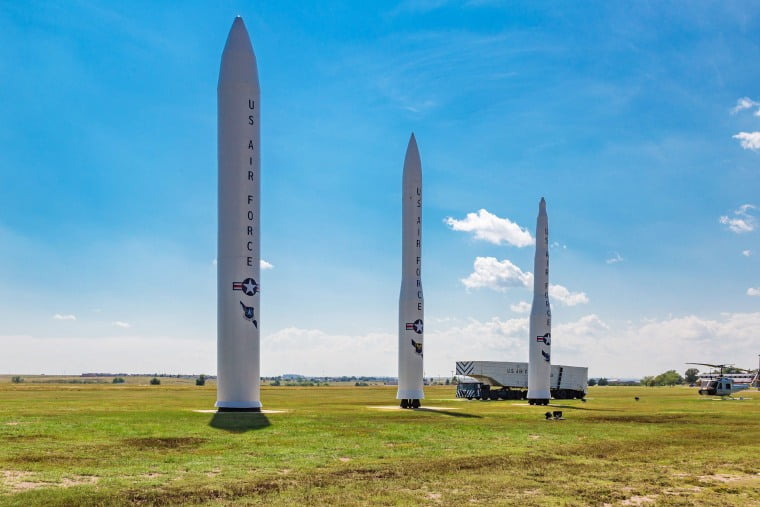The Biden administration cited national security concerns in ordering MineOne to divest from the land near Francis E. Warren Air Force Base in Wyoming.

Citing worries for national security, President Joe Biden signed an order on Monday requiring a bitcoin mining company with Chinese backing to sell land close to a nuclear missile site in Wyoming.
The property estate was purchased by MineOne in June 2022, putting the company’s activities just one mile from Francis E. Warren Air Force station, which the White House describes as a “strategic missile base and key element of America’s nuclear triad.”
The company’s site contained “specialized and foreign-sourced equipment potentially capable of facilitating surveillance and espionage activities,” the presidential order said.
The corporation, a British Virgin Islands business with a Chinese majority ownership, may “take action that threatens to impair the national security of the United States,” according to Biden, who cited “credible evidence” in support of this belief.
MineOne was given instructions to remove specific improvements and equipment from the property and to divest from the land within the following 120 days. CNBC’s request for comment was not immediately answered by the corporation.
The Biden administration’s action comes amid tensions between the two largest economies in the world and a broader crackdown on Chinese businesses in the United States in the run-up to the next presidential election.
On the basis of national security, Biden signed a bill in April requiring the social media network TikTok to be separated from its Chinese parent firm, ByteDance. The administration imposed fresh taxes on a number of Chinese products on Tuesday, including technology, medical supplies, and electric cars.
The Committee on Foreign Investment in the United States, a federal organization led by the Treasury Department that looks into business transactions for potential national security issues, conducted an inquiry that resulted in the most recent order directed at MineOne.
A 2018 law granted CFIUS the authority to review property transactions close to sensitive U.S. facilities, including Francis E. Warren Air Force Base.
Biden directed the committee to take into account additional national security risk considerations in its assessments through an executive order he signed in September. Additionally, the CIA has started looking into TikTok.
According to the White House order, MineOne’s property purchase was not filed to CFIUS until after the agency launched an investigation following a tip from the public.
The action against MineOne “highlights the critical gatekeeper role that CFIUS serves to ensure that foreign investment does not undermine our national security,” Treasury Secretary Janet Yellen said in a statement.
Citing concerns for national security, China has likewise stepped up its surveillance of American corporations in recent years. The nation recently expanded the definition of “work secrets” in its laws prohibiting the sharing of state secrets.
Following a security review, the nation also prohibited several American tech companies, including Micron, from selling to operators of vital infrastructure within the nation and tightened restrictions on several foreign consulting firms in the previous year.
FAQ
1. How does cryptocurrency mining work?
The process of creating new digital currency units, typically known as coins, is called cryptocurrency mining. This method of mining is different from traditional pickaxe mining in that it uses computer processors to solve intricate mathematical problems. This is how it operates:
Blockchain: The technology that underpins cryptocurrencies is known as the blockchain. Consider it as a series of blocks, with a certain quantity of cryptocurrency (e.g., 6.25 Bitcoin) in each block.
Validation: Miners must solve a challenging mathematical equation (sometimes expressed as a hash) in order to unlock a new block. This verification procedure guarantees the blockchain’s integrity.
Ledger: The cryptocurrency’s ledger keeps track of each new coin that is unlocked. This ledger makes the dates of coin mining and transaction activity visible to the public.
2. What are the environmental impacts of cryptocurrency mining?
The mining of cryptocurrencies has a substantial negative impact on the environment because of the energy used and garbage produced. The salient points are as follows:
Energy Consumption: The energy requirements of Bitcoin and other proof-of-work cryptocurrencies are substantial, surpassing those of certain small nations. For example, the annual electricity consumption of Bitcoin alone is expected to be 140 Terawatt-hours (TWh), or 0.63% of the world’s total electrical use. The second-largest cryptocurrency, Ethereum, uses 0.01 TWh annually.12.
Carbon Emissions: Fossil fuels are utilized to create around half of the power used in mining, which leads to carbon emissions. This has an impact on climate change.
Electronic Waste: Because cryptocurrency mining uses specialized computer hardware that has a limited lifespan, electronic waste is produced.
Water Footprint: The water footprint of cryptocurrencies is a source of worry, particularly in areas where water shortage is a problem1.
Connect with us for the Latest, Current, and Breaking News news updates and videos from thefoxdaily.com. The most recent news in the United States, around the world , in business, opinion, technology, politics, and sports, follow Thefoxdaily on X, Facebook, and Instagram .
